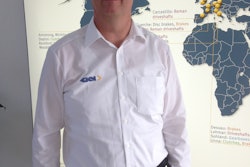Volvo’s New River Valley (NRV) assembly plant in Dublin, VA, has achieved zero landfill status at its truck manufacturing operations. Waste generated by the facility, which manufactures all Volvo trucks sold in North America, is now recycled, composted or converted to electricity. The 1.6 million square-foot heavy-duty truck assembly plant is one of the Volvo Group’s largest manufacturing facilities in the world, and the company’s first in North America to achieve zero landfill status.
“Care for the environment is a defining trait of Volvo and its operations,” says Mikael Bratt, the Volvo Group Executive Vice President Responsible for Volvo Group Trucks Operations, which is the company’s global truck manufacturing organization. “I commend the New River Valley plant for its leadership in our global efforts to minimize the environmental footprint of our operations and the products we manufacture.”
Bratt visited the New River Valley plant in conjunction with a worldwide tour of the Volvo Group’s manufacturing and distribution centers.
“We’re proud to be at the forefront of environmental improvements to the truck production process,” says Lars Blomberg, Vice President and General Manager of the NRV assembly plant. “Eliminating waste from our assembly plant has truly been a journey of a thousand steps, each building on the previous. We also believe it is important to our customers that their trucks are produced in an environmentally friendly manner.”
NRV’s journey began in 2003 by first identifying and evaluating all solid and liquid waste streams within the plant. Once identified, the plant’s environmental team introduced a framework to better coordinate recycling efforts and began expanding reuse, recycling and composting opportunities. Intensive evaluation of materials flow and work with parts and raw materials vendors resulted in a transition from cardboard boxes to reusable shipping containers and the elimination of styrofoam and foam rubber from parts packaging. NRV also changed its paint process to capture, reconstitute and reuse solvents typically used to flush paint lines, and utilize paint sludge to help power a cement kiln. Waste reduction efforts also extend to NRV’s on-site cafeteria, where all food waste, utensils, cups and containers are compostable.
“The success of our waste reduction program is a direct result of the daily participation of our people and their support and involvement in the improvement of recycling and production processes,” Blomberg says. “In addition to the obvious environmental benefits, our efforts to reduce waste and energy have continued to improve the competitiveness of our manufacturing operations in southwest Virginia.”
Based on current figures, the energy content of the waste NRV is keeping out of landfills each year equates to:
- Conserving the amount of energy required for 604 households annually, or
- Conserving 9,348 barrels of oil, or
- Conserving 434,291 gallons of gasoline, or
- Saving 14,509 mwh of electricity
In early 2012, NRV became the first U.S. facility to be certified to ISO 50001 standards under a pilot program supported by the U.S. Department of Energy. NRV is also the first Superior Energy Performance (SEP)-certified facility to use ISO 50001 as its energy management system standard. ISO 50001 and SEP are, respectively, the top international standard and top U.S. certification program for driving continuous improvements in energy efficiency. While technologies like building automation systems, solar hot water heaters and infrared heaters helped drive NRV’s energy reductions, many of the energy-saving ideas have come from employees.



















